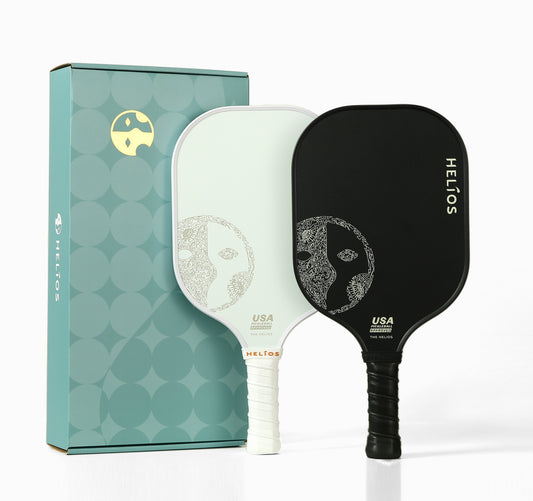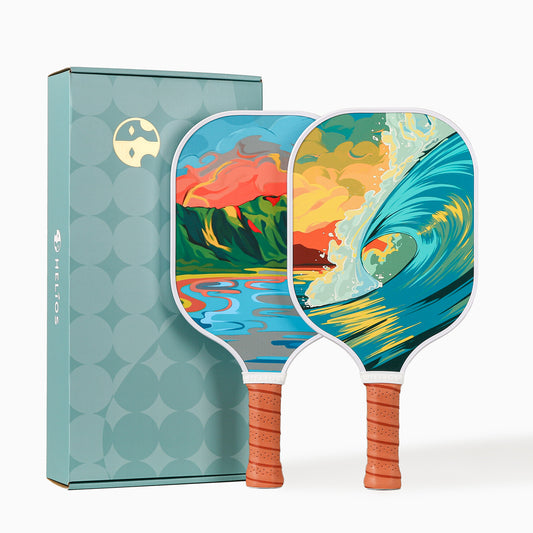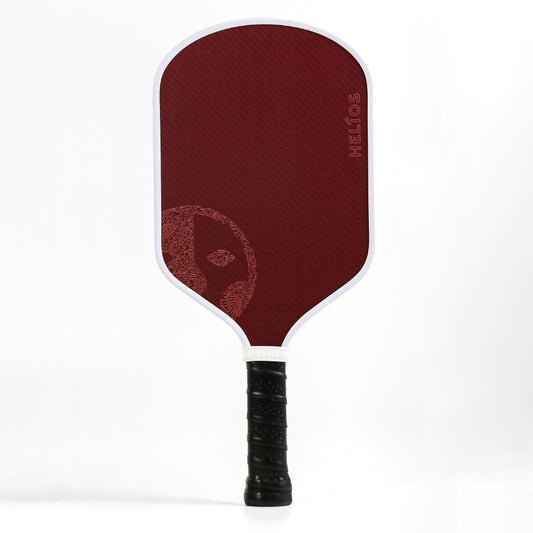Pickleball Etiquette: Do’s and Don’ts on the Court

Introduction: The Unwritten Rules That Keep Pickleball Fun
Pickleball's explosion in popularity is largely due to its accessibility, its fun factor, and the wonderful community it fosters. While learning the official pickleball rules is essential, understanding and practicing good pickleball etiquette is just as crucial for ensuring everyone enjoys their time on the court.
These unwritten rules of conduct, sportsmanship, and respect contribute significantly to the positive atmosphere that makes pickleball so appealing. Whether you're a seasoned player or just stepping onto the court with your first paddle, knowing the do's and don'ts of pickleball etiquette will make you a welcome presence in any game.
Many players, especially those new to the sport, might wonder about specific nuances – from basic on-court behavior to more subtle points like pickleball paddle etiquette. For instance, while the official pickleball paddle rules govern equipment specifications, there's also an element of etiquette regarding how paddles are handled and respected.
Our guide will delve into the essential aspects of on-court manners, helping you navigate social play, recreational games, and even more competitive environments with grace and sportsmanship. Knowing how to choose a pickleball paddle is important, but knowing how to conduct yourself on the court is paramount.
Read More: Mastering Pickleball Dink: Technique, Strategy & Benefits
Core Principles of Pickleball Etiquette
At its heart, good pickleball etiquette revolves around a few core principles: safety, respect, fairness, and communication.
- Safety First: Always be aware of your surroundings and other players. Avoid wild swings or movements that could endanger others. Call out "ball on court!" loudly if a stray ball enters your or an adjacent court to prevent trips and falls.
- Respect for All Players: Treat your partners, opponents, and those waiting for a court with courtesy and respect, regardless of their skill level. Acknowledge good shots from anyone on the court.
- Fair Play: Make line calls accurately and honestly. If you're unsure about a call, give the benefit of the doubt to your opponent. Understand the basic pickleball rules to avoid unintentional infractions.
- Clear Communication: Communicate effectively with your partner regarding shots ("yours!" "mine!" "out!"), and with opponents when necessary (e.g., announcing the score clearly before serving).
Adhering to these principles forms the foundation of positive pickleball etiquette and contributes to a more enjoyable experience for everyone involved.
On-Court Do’s: Playing with Good Manners
Practicing good pickleball etiquette involves several positive actions on the court:
- DO Introduce Yourself: If you're playing with new people, a friendly introduction and a paddle tap before the game starts is a great way to build camaraderie.
- DO Announce the Score Clearly Before Serving: The server is responsible for announcing the score, stating their score first, then the opponent's score, followed by the server number (1 or 2, for doubles). This is a fundamental part of pickleball rules and etiquette.
- DO Make Line Calls Promptly and Clearly: Use clear hand signals (e.g., finger pointing up for "out," palm down for "in") along with a verbal call. If a ball is out, call it "out" loudly and immediately. If it's in, you can say "in" or simply play on.
- DO Compliment Good Shots: Acknowledge great plays by your opponents or partner with a "nice shot!" or a paddle tap. Sportsmanship is key to good pickleball etiquette.
- DO Wait for Players to Be Ready: Before serving, ensure your opponents and your partner are ready. A quick glance or a verbal "ready?" is good practice.
- DO Retrieve Stray Balls Politely: If a ball from another court comes onto yours, stop play and return it (or let them retrieve it) safely. Similarly, if your ball goes onto another court, wait for a pause in their play before asking for it or retrieving it yourself.
- DO Paddle Tap After the Game: Regardless of the outcome, a paddle tap with all players at the net is the customary way to end a game, signifying good sportsmanship.
- DO Be Mindful of Court Rotation: In open play situations where courts are shared, be aware of court rotation systems (e.g., paddle racks, sign-up sheets) and follow them fairly to ensure everyone gets a chance to play. This is a crucial aspect of community pickleball etiquette.
- DO Offer to Play with Different People: In recreational settings, be open to mixing up partners and playing with individuals of varying skill levels. This fosters an inclusive environment.
- DO Bring Your Own Equipment: While some venues might have loaner paddles, it's generally expected that players will bring their own pickleball paddles and balls. If you're unsure how to choose a pickleball paddle, many resources and local pros can offer guidance. Consider a versatile option like the Helios Gaia if you're starting out.
On-Court Don’ts: Avoiding Pickleball Pitfalls
Equally important to knowing the "do's" is understanding what actions to avoid to maintain good pickleball etiquette:
- DON'T Question Opponents' Line Calls (Excessively): While an occasional polite inquiry might be acceptable if you genuinely couldn't see, constantly questioning or arguing line calls is poor form. The pickleball rules state that players call the lines on their side of the net.
- DON'T Offer Unsolicited Advice or Coaching: Unless someone specifically asks for your input, refrain from coaching your partner or opponents during a game. It can be perceived as condescending.
- DON'T Walk Behind a Court During a Point: Wait for the point to finish before crossing behind a court to avoid distracting players.
- DON'T Overdo Celebrations or Show Excessive Frustration: While enthusiasm is great, overly loud or disruptive celebrations, or displays of anger (like slamming a paddle), are generally frowned upon. Maintain composure.
- DON'T Wear Inappropriate Footwear: Always wear proper court shoes designed for racquet sports. Street shoes can damage courts and increase your risk of injury.
- DON'T Monopolize Courts: In open play, be mindful of others waiting and adhere to any established court rotation rules.
- DON'T Hit Balls Recklessly During Warm-ups: Warm up with control. Avoid smashing balls at opponents who are not ready or hitting balls wildly that could go into other courts.
- DON'T Distract Players During a Point: Avoid unnecessary talking, shouting, or sudden movements when a point is in play on your court or adjacent courts. This includes loud phone conversations.
- DON'T Blame Your Partner: Pickleball is often a team sport. Avoid blaming your partner for lost points. Offer encouragement instead. Good partnership is key to pickleball etiquette.
Pickleball Paddle Etiquette: Handling Your Equipment with Respect
Beyond general on-court behavior, there's also specific pickleball paddle etiquette to consider. Your paddle is your primary tool, and how you handle it (and respect others' equipment) matters.
Choosing Your Paddle: A Quick Etiquette Note
While how to choose a pickleball paddle is largely a personal decision based on factors like the pickleball paddle weight guide and desired pickleball paddle grip size, there's a subtle etiquette point. Is it acceptable to comment on opponents' paddle choices? Generally, no. Unless you are specifically asked or are in a friendly discussion about equipment, avoid making unsolicited comments, positive or negative, about an opponent's paddle. Players choose their paddles, like the high-performance Helios Athos or the control-oriented Helios Selene, for specific reasons that suit their game.
Paddle Taps: The Pickleball Handshake
The paddle tap is a universal gesture in pickleball.
- Before the Game: A light tap of paddles with your partner and opponents is a friendly way to start.
- After Good Points: Partners often tap paddles to acknowledge a good play or offer encouragement.
- After the Game: Always tap paddles with all players at the net as a sign of sportsmanship, akin to a handshake. This is fundamental pickleball paddle etiquette.
Handling Your Paddle Respectfully
- Avoid Throwing or Slamming: Never throw your paddle or slam it on the court or against the net in frustration. This is poor sportsmanship and can damage your paddle and the court.
- Don't Use Your Paddle to Retrieve Balls Excessively: While a gentle scoop might be okay, repeatedly scraping your paddle on the ground to pick up balls can damage the edge guard and face. Bend down and pick up the ball.
- Respect Others' Paddles: Don't touch or use someone else's paddle without their explicit permission. Paddles are personal equipment.
Specific Pickleball Paddle Rules and Etiquette
- USAPA Approved Paddles: For sanctioned tournaments, your paddle must be on the USAPA approved list. While not strictly an etiquette rule for recreational play, using an approved paddle shows respect for the sport's standards. Helios paddles, like the Helios Apollo, are designed to meet these rigorous standards.
- Modifications: Be aware of rules regarding paddle modifications. Excessive tape or unapproved alterations might be against pickleball paddle rules in formal settings.
- Can I switch paddles during a game? According to official pickleball rules, a player cannot switch paddles during a game unless it is broken or damaged in a way that makes it unplayable. If your paddle breaks, you can switch to a backup. It's good pickleball etiquette to have a similar backup if possible to avoid significant changes in play.
Pickleball Paddle Grip Etiquette
While there isn't a specific "etiquette" for your grip itself, ensuring your pickleball paddle grip size is appropriate and your grip material is in good condition (e.g., not overly worn or slippery) contributes to safer and more consistent play, which indirectly benefits everyone on the court. Regularly changing your overgrip is good practice.
Navigating Different Playing Environments
Pickleball etiquette can sometimes vary slightly depending on the setting:
Recreational Open Play
This is often the most social environment. Key etiquette points include:
- Being welcoming to new players.
- Rotating in and out of games fairly.
- Playing at a level that is enjoyable for the group (e.g., not consistently smashing balls at less skilled players unless they are comfortable with it).
- Understanding local court rules and paddle stacking systems.
League and Tournament Play
While still emphasizing sportsmanship, competitive play often involves stricter adherence to official pickleball rules and a more focused demeanor.
- Know the rules thoroughly.
- Make clear and decisive line calls.
- Minimize chatter during points.
- Be punctual for matches.
Private Lessons or Drills
- Be respectful of the instructor's time and guidance.
- Focus on the drills and avoid distracting others.
- If sharing a court for drills, be mindful of space.
Conclusion: Being a Great Pickleball Citizen
Practicing good pickleball etiquette is about more than just following rules; it's about contributing to a positive, respectful, and enjoyable environment for everyone. From understanding basic pickleball rules and on-court manners to specific pickleball paddle etiquette, your conduct reflects on you and the sport as a whole. By embracing the do's and avoiding the don'ts, you not only become a better player to play with but also help preserve the friendly and inclusive spirit that makes pickleball so special.
So, as you head to the courts with your favorite paddle, perhaps a finely tuned instrument from the Helios Pickleball collection, remember that how you play the game is just as important as how well you play. Game on, and play with respect!
Frequently Asked Questions
What are the most important basic etiquette rules every pickleball player should know?
Announce the score clearly before serving, make fair line calls, wait for players to be ready before serving, and always tap paddles after a game. Respect for all players and safety are paramount in pickleball etiquette.
Are there any specific pickleball paddle rules regarding what type of paddle I can use?
For recreational play, most paddles are fine. For USAPA-sanctioned tournaments, your paddle must be on their approved list and meet specific size, surface, and modification pickleball paddle rules.
Is it considered bad pickleball etiquette to aim shots at an opponent's body?
While aiming at the body (tagging) is a legal play in pickleball rules, repeatedly and intentionally doing so, especially at a less skilled opponent's face or in recreational play, can be considered poor pickleball etiquette. Aim for sportsmanship.
What should I do if I disagree with an opponent's line call?
In recreational play, generally accept your opponent's call. You can politely ask "Are you sure?" once, but avoid arguing. In tournament play, you can appeal to a referee if one is present, per official pickleball rules.
How does pickleball paddle grip etiquette play into the game?
There isn't specific "grip etiquette," but ensuring your pickleball paddle grip size is correct and your grip is well-maintained (not slippery) contributes to better control and safer play, which is good for everyone.








